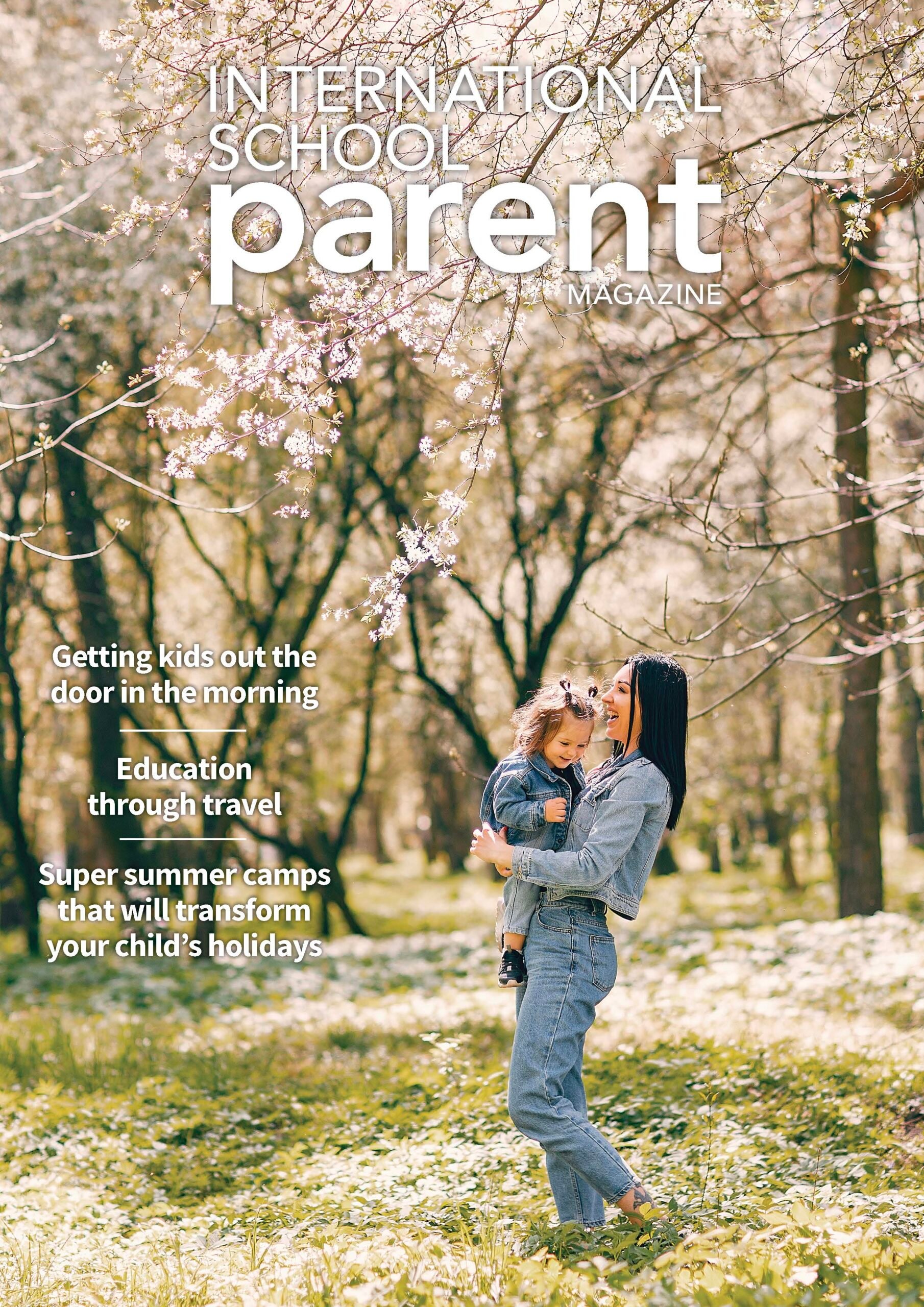Meet the Headteachers – Stephen Spicer – Sherborne Qatar Senior School
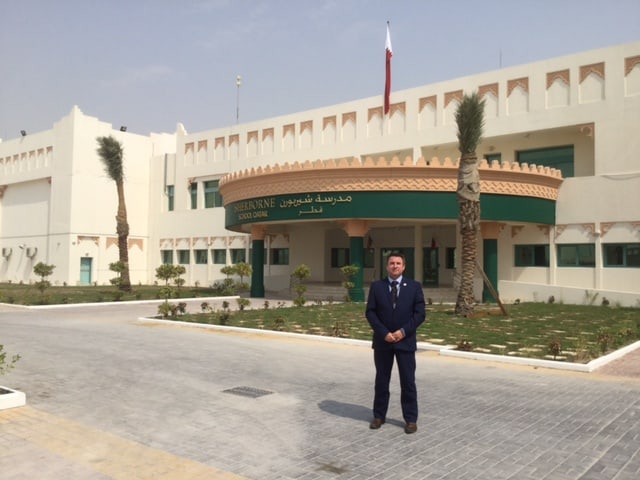
Stephen Spicer has been Headmaster of Sherborne Qatar Senior School since August 2016. Prior to that, he had a distinguished career in international education spanning schools in El Salvador, Bahrain, and across the U.K. He has an NPQH, a first class honours degree in Business Administration from the University of Wales, College of Cardiff (UWCC) and a Secondary Education PGCE in Business and Economics from The Institute of Education, University of London. Sherborne Qatar Senior School is a British international school based in Doha, established in 2009. The school attracts both local and international students. Its aim is developing well-rounded students by nurturing their potential inside and outside the classroom.
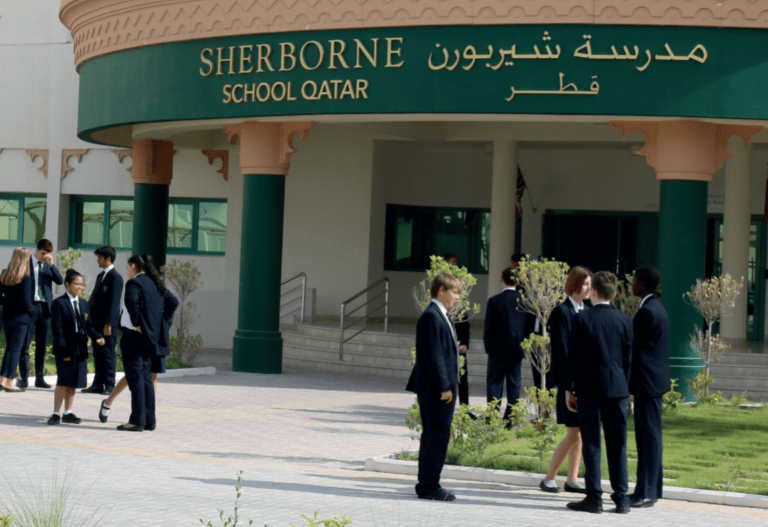
What initially inspired you to pursue a career in education?
My main inspiration was my wife. After university, she was very clear on what she wanted to do and went straight into teaching. I wasn’t so clear and ended up in social and market research. During that time I was working with her at various after-school events. There was a real contrast between what she was doing, which was positive and worthwhile, and what I was doing. I realised that I wanted to do something which had a positive impact on the world, and that was my reason for going into teaching. Teaching also gave me the chance to share my passion for Economics and Business Studies and to experience how rewarding it is to work with young people.
How have those skills from your previous career helped or informed your approach to a career in education?
I worked for two years in publishing before going to university, and a lot of those skills have been transferable. Publishing taught me useful things that have helped me in my school roles like presenting, report writing, proofreading, marketing, and organisation. When teaching Economics and Business Studies, it is beneficial to be able to draw upon real-life experiences. It adds a bit of flavour to what you’re teaching.
The biggest life lesson I’ve taken from my work experience is being able to put things into perspective. As you grow up, you become less self-centred. You notice many people around you have had quite challenging lives, and you meet inspirational people who’ve coped with so much. Being able to take a step back and put situations into perspective is essential when you have a stressful job.
What are some of the most significant learning experiences you’ve had from your time as a head teacher?
Being in school leadership overseas is a very demanding job, and probably more dynamic and involved than the typical U.K. head teacher position. I’ve had some unusual experiences during my career. I was evacuated from Bahrain during the Arab Spring; the 2010 eruptions of Eyjafjallajökull prevented many of the staff from returning to work after a school holiday, and there were flash floods and earthquakes in El Salvador. Being a head teacher has presented many different challenges, but I’ve enjoyed it and have learned to be flexible. Given the uncertainty and unpredictability that you often encounter working abroad, you learn to expect the unexpected, to have a backup plan, and to stay calm. It’s important to be able to take a step back and give things careful consideration. Having a sense of humour, and to not take yourself too seriously, is also an excellent survival mechanism.
There are also global challenges that impact your school, because of its nature as an international school. There are so many variables that you have to deal with internationally that you don’t if you’re in your home country as a headmaster. In our school, for example, we’re catering for families from 54 different nationalities who have varying degrees of understanding what it means to be in a British school, what we hold as necessary, and what we’re trying to achieve.
What would you say characterises a student graduating from Sherborne Qatar Senior School?
I’d say academically well-prepared, but that’s only part of the school’s job. What I’m impressed by is how confident, articulate, responsible and emotionally intelligent our students are. When I first went overseas, my head teacher used to talk about the students being “all-around good eggs”. I think it is vital for students to not only have an excellent academic foundation but also to be emotionally prepared for life. By that, I mean being an understanding and kind individual that’s going to be able to contribute positively to the world. I’m proud of our students. They get involved with and support numerous charities, and they are a charming group of young people.
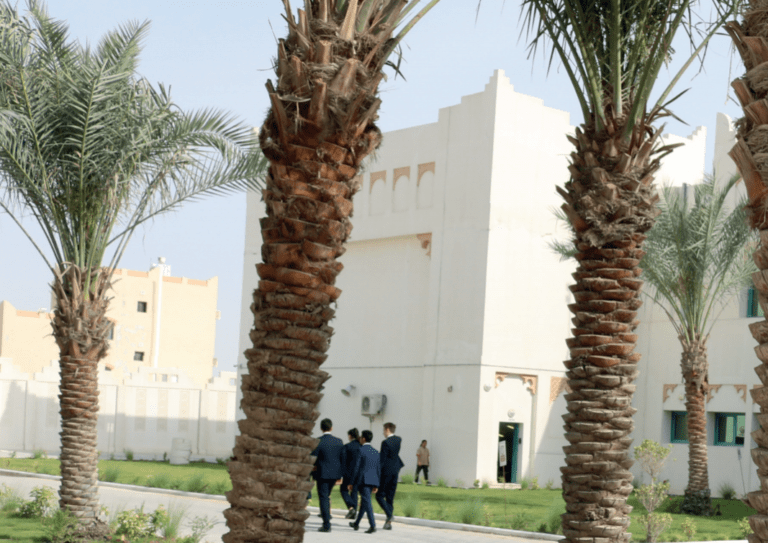
What would you say makes the learning environment extra special at Sherborne Qatar Senior School?
Regarding the physical building we’re well-equipped, but what makes our learning environment unique is the approach of the staff and the culture we’ve developed here. The learning environment is unique because the students realise that we genuinely care about them and that we know them as individuals. We’re not a big school, and we do not want to be. Some large schools are cold impersonal examination factories. We want to know our students, and their parents, as individuals. We believe in a holistic approach to education and catering for all the needs of our students.
What do parents say that they value about Sherborne Qatar Senior School?
Parents greatly value our holistic approach, and the opportunities we give to our students. In a recent survey of our parents, it was encouraging to see that they recognise that we do genuinely care, that our teachers are very dedicated and professional, and that we promote the ambitions of the whole child.
Could you summarise the main principles and philosophies that you promote at Sherborne Qatar Senior School?
At Sherborne, we offer a values-based education. Our values are fundamental to us, and they’re not just things which are plastered on the walls and forgotten. They are a theme, a thread, that runs through the school. Our school values are responsibility, teamwork, friendship, respect, perseverance and honesty.
Our approach is designed to give students opportunities to grow and to achieve. With today’s world being increasingly changeable, what’s also important is to instil the need for lifelong learning. A slogan we’ve recently adopted to reflect this is, “Made for life”. It’s important to encourage our students to be flexible and adaptive. I imagine many of students will have jobs in the future that don’t even exist right now. They are also likely to change careers multiple times. I think that’s exciting, but also quite scary and you need the right skill set to cope with that amount of change.
How do you draw out the best from your students academically?
It’s imperative to encourage students to see education, not as something that’s done to them. Students need to engage in and be responsible for their learning. They need to know their targets, what they’re good at, and what they need to do to improve. It’s about adopting a positive growth attitude – and having that ‘can-do’, success attitude. Once you feel good about yourself and what you can achieve, you gain the confidence to do more and try even harder. We believe that it is vital to give all our students the opportunity to shine and feel good about themselves, and we seek to celebrate success whenever we can.
We also work to address the negative attitude to success that you sometimes find amongst young people. It’s unfortunate when you encounter a negative attitude towards doing well, almost as though doing well is an embarrassment. Sometimes this happens with teenagers, and we try hard to work against that notion. We make sure our students know that they should feel good themselves and that it’s okay to be publicly pleased about having done well.
Can you choose and describe an area of education or an extracurricular activity that’s unique or different at your Sherborn Qatar Senior School?
We’re doing a lot to develop our post 16 programmes. We’re expanding our provision and will, with the introduction of Politics and Media Studies, have an impressive 21 AS/A Levels on offer from September. From September 2018 we will also be offering a BTEC for students interested in a career in business and who want to study the subject in depth. We’re doing this because we see ourselves as a family-orientated inclusive school. We want to provide flexibility regarding learning styles and regarding our students’ aspirations. We believe that is important to provide Year 12 and Year 13 students with a variety of post 16 pathways. This approach, range, and choice of subjects for sixth formers is unusual in Qatar.
Another example of our uniqueness is our approach to enrichment. We’ve changed our school day to encourage more students to take part in activities after school and enrichment is now increasingly seen as part of a school day. Each week we offer 50 plus different enrichment activities. We’re offering students a wide range of experiences so that they can develop their existing interests, as well as explore new opportunities. We’re doing all we can to encourage our students to create a range of interests because this builds confidence, promotes time management, and it’s part of the ‘can-do’ culture we are cultivating at Sherborne. This approach creates well-rounded young people and gives our students multiple opportunities to achieve and to feel positive about themselves.
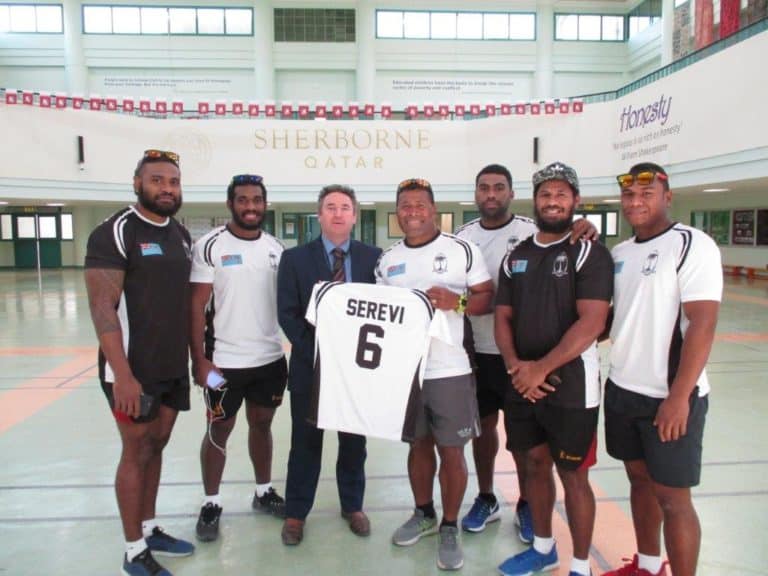
How do you encourage understanding between different cultures and nationalities at Sherborne Qatar Senior School? A lot of the other headteachers I’ve spoken to find that understanding is something that already exists because there are so many nationalities in the school. What’s your experience?
Young people don’t tend to see differences. They don’t know what country somebody’s come from, what their religion is or what colour their skin is. If they’ve grown up in an international environment, it’s not something they often even think about. It’s just their classmate, their friend. Internationally students tend to quite transient, so because they’ve got a recent memory of settling in, and finding new friends themselves, they typically embrace and welcome new people. It’s a very positive environment to work in.
It’s also crucial for a school to show that cultural diversity is a great thing and to give opportunities to celebrate the different cultures and backgrounds of students. A real starting point for this is to be respectful and sensitive to the country you’re in. That’s easy here as Qatar is a great country; it’s a very family friendly, forward-thinking, safe and welcoming country.
How do you help your international students and families settle in when they first arrive?
We start with that before they arrive. Many families come out to look at the school in advance of moving, and we give them as much time as we possibly can. We offer individual tours and make ourselves available afterwards to answer questions. It may be that they’re new to the British system, or they may want to know how we differ from a school in the UK. You’ve got to put yourself in their shoes. Think like a parent more than a teacher, and understand that this can be an enormous change for families.
When it comes to students, we’re very fortunate. Our students are our best asset. New students are warmly welcomed and integrate very quickly, but we do have buddies and the usual school mechanisms to help new students settle.
How do you make the most of everything Qatar has to offer?
We build positive relationships with companies and other entities outside for many of our programs. For example, a lot of our enrichment programs don’t happen on-site, and we are increasingly utilising external providers. It’s essential to understand what is available here entirely and to develop those contacts for the benefit of our students. Qatar is an incredibly dynamic country. It has a vibrant culture, and the state has invested heavily in sports and the arts. The National Library, for example, is fantastic and we’ve got some of the best sporting facilities in the world. Organisations here are happy to help the school and working closely with them means we can do even more for our students.

What are some of the main trends and challenges you see in the future of education?
Regarding trends, there is a lot of emphasis on learning outside the classroom. Increasingly secondary education will be seen as something not confined to school hours, and technology will be utilised more and more to do this.
Personalised learning is becoming increasingly important. Students learn in different ways and at different paces, and I think schools will increasingly personalise each child’s learning program.
The future is also going to see more collaboration between schools. We’re not in competition; schools have common aims.
Another thing, which is happening but needs more attention, is a greater focus on mental health issues in young people. We have to look at all the children’s needs and appreciate that, for some young people, growing up can be a very challenging time. We need to make sure we are supporting young people the best we can.
As far as challenges, one of the big ones is the shortage of quality teachers. The appeal of the profession is under threat, and I believe schools in the future will struggle to find high-quality teachers. Because of this, teacher retention is also likely to become an issue. There’s also an explosion of international schools, and the increase in schools is faster than the rise in new teachers.
Technology will continue to be a challenge, regarding knowing when to adopt and what exactly you should be utilising. It’s easy to sit back, watch, and see what the best practice is; but then you are playing catch-up, and you’re behind. Technology is a vital part of our lives, and it’s going to continue to change education dramatically.
About Sherborne Qatar Senior School
Sherborne Qatar Senior School and Sherborne Qatar Prep School are two British schools based in Doha, Qatar. They are the sister schools of the historical public school, Sherborne School. The motto of the two schools is “Education For Life”
